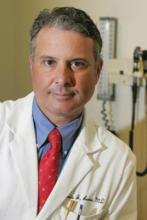As studies documenting the toll that obesity and excess weight have on health and mortality continue to be reported, access to multidisciplinary weight-loss programs remain poor – and the approved weight-loss drugs have dwindled to just orlistat and phentermine.
With the absence of effective pharmaceutical options and inconsistent insurance coverage of multidisciplinary weight-loss programs, the options that clinicians have available to address the treatment gap between basic lifestyle changes and referral for surgical treatment of obesity now include improved in-office counseling, setting modest weight-loss goals, the use of medications with weight loss as a side effect for indicated conditions, and online weight-loss programs.
A recent study of national health survey data suggests that frank conversations are far more motivating than previously thought. Researchers found that fewer than half of overweight people surveyed and fewer than two-thirds of the obese people surveyed had been told by their physicians that they were overweight. The study also found that if their physicians had told them they were overweight, the odds that the patient would see themselves as overweight and would try to lose weight would increase considerably.
Dr. Adrienne Youdim, medical director of the center for weight loss at Cedars-Sinai Medical Center, Los Angeles, said in an interview that the study shows that "physician advice goes a long way towards patients recognizing the condition [and] is a first step in addressing the condition." Although there are multiple barriers to effective weight-loss treatment that are often cited (including lack of resources, lack of reimbursement, personal physician bias, or lack of comfort in addressing this disease), "from a preventive medicine standpoint [and] as internists and primary care physicians, we need to take this challenge not only in identification and diagnosis but also [in] providing guidance and counseling on how to address the problem," said Dr. Youdim, who was not involved in the study. Without intervening at the front lines, "we cannot sway the tide of what has become the No. 1 public health crisis in the United States."
She also recommended helping patients keep modest weight-loss goals that are achievable with lifestyle changes. "When you’re talking about disease burden, a lot can be gained from modest weight loss and small lifestyle changes – an important point that is often understated," she said, referring to a study indicating that patients would reach their desired weight if they lost more than 100 pounds, and that they would be disappointed if they lost 17% of their body weight. But that is a substantial amount of weight, she pointed out, particularly because a 5%-10% weight loss results in significant cardiometabolic improvements.
Many studies show "that physician-guided advice goes a long way, and that it doesn’t have to be intensive," Dr. Youdim said. Physicians can use outside resources for behavioral modification if they don’t have a dietician on staff. She recommends programs like Weight Watchers, Overeaters Anonymous, and TOPS Club, which can be augmented with in-office counseling and even applications that are available for smart phones and can used by a motivated patient to help monitor food intake, she added.
"Be forceful, direct, and blunt in your discussions with patients about the need for the interventions in terms of diet and exercise," as advocated by the American Heart Association, the American College of Cardiology, the American Diabetes Association, the American Association of Clinical Endocrinologists, and other organizations, said Dr. Helena Rodbard, an endocrinologist in Gaithersburg, Md. She recommended that clinicians calculate the body mass index of their overweight and obese patients "and let people know where they stand in terms of the percentiles of their body weight compared to the norms set before the current epidemic." She advises clinicians to screen patients for metabolic syndrome, prediabetes, and diabetes, and to inform them about their risk factors, using calculations from available programs about patients’ risks of developing heart disease or diabetes within the next 5-10 years. She emphasized paying special attention to obesity in youth and adolescents, who "will be obese for life and have diabetes early and diabetic complications early."
In an interview, Dr. Rodbard said that because of logistical issues and costs, she rarely refers patients to a weight-loss program; instead, she counsels them and arranges for them to see a dietician in her office 1 or 2 days a week. "Frequent return visits and motivational sessions within those visits are helpful," she said, advising clinicians to use the services of a dietician when possible, and to "fight for better reimbursement for those kinds of services."



